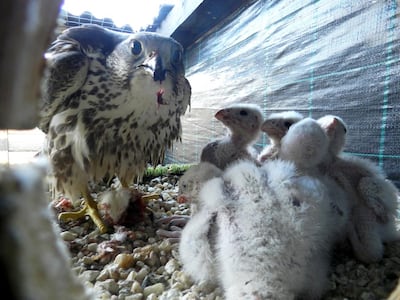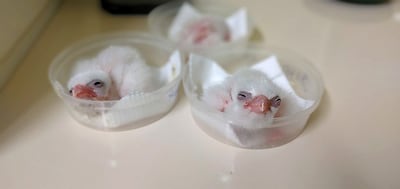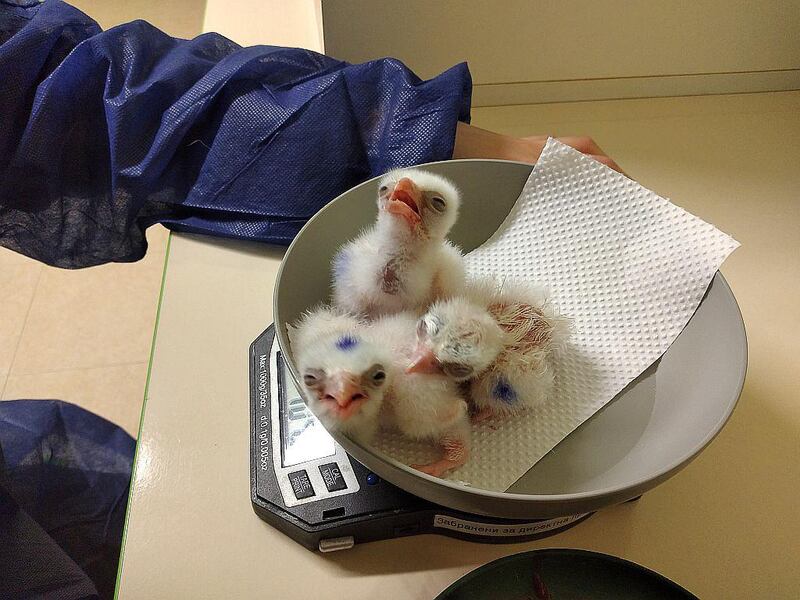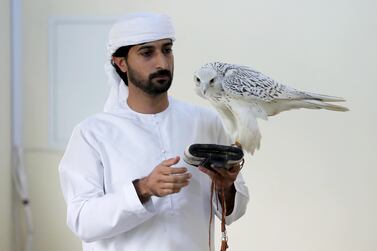A breeding programme in partnership with Bulgarian conservationists will see 100 rare saker falcons released into the wild.
The project, backed by the Mohamed bin Zayed Raptor Conservation Fund, aims to boost numbers of falcons in the southern Balkans.
Conservationists have already hatched five chicks at the Green Balkan Wildlife Rehabilitation and Breeding Centre in Stara Zagora, Bulgaria.
The success is the result of years of research conducted by the Environment Agency Abu Dhabi in partnership with Bulgaria’s Ministry of Environment and Water.

“This project is a great step in the right direction to ensure a sustainable future for saker falcons in the Balkans,” said Majid Al Mansouri, the fund’s managing director.
“In 2018, the first record of breeding in the wild since 1998 involved a pair of captive-bred birds from the 2015 release cohort; they returned to breed successfully again in 2019.
“The hatching of these five chicks is a landmark event that will support the ongoing efforts of the Green Balkans project team to restore breeding sakers in the Southern Balkans,” he said.
The breeding population in the Southern Balkans became extinct in the late 20th Century due to habitat degradation and poaching.

The breeding population of wild saker falcons had previously extended through the Balkans from Central Europe to Western Kazakhstan with the birds migrating to North Africa and the Arabian Peninsula.
The first born under the latest breeding programme was a male chick, named Victor.
He is among a “fantastic five” on which lies the hopes of the reintroduction project from which at least 20 chicks will eventually be released.
During a previous reintroduction programme, EAD released 14 birds in the region between 2012 and 2014.
The birds were tracked as they migrated between Romania, Libya, Turkey, Greece, Ukraine, Russia and Serbia.
Since then, 67 more saker falcons were released between 2015 and 2018 with the first confirmed nesting in the wild from captive bred birds in 20 years.
Under the current project, a further 100 falcons will be released into Bulgaria’s lowland agricultural areas over the next five years.
They will continue to be monitored to learn more about how they adapt to the wild and to improve the numbers flying freely across Europe.
“With the ongoing co-operation between the nations, we are optimistic the wild saker falcons will be revived,” said Ivaylo Klisurov, Manager of the Green Balkans WRBC.
The Emirates has a strong track record for reintroducing rare birds back into the wild.
More than 40 years ago, the UAE began a multimillion-dirham programme to repopulate natural habitats with captive bred houbara birds.
Since then, the Sheikh Khalifa Houbara Breeding Centre in Abu Dhabi, has helped develop one of the largest repopulation programmes of an endangered species anywhere in the world, increasing the number of captive bred birds from about 39,137 to more than 55,505.







